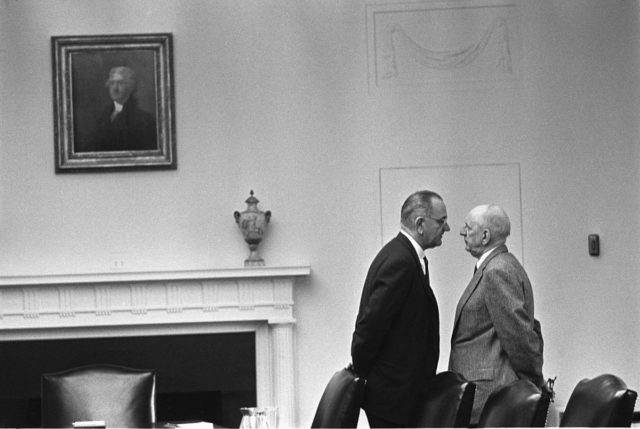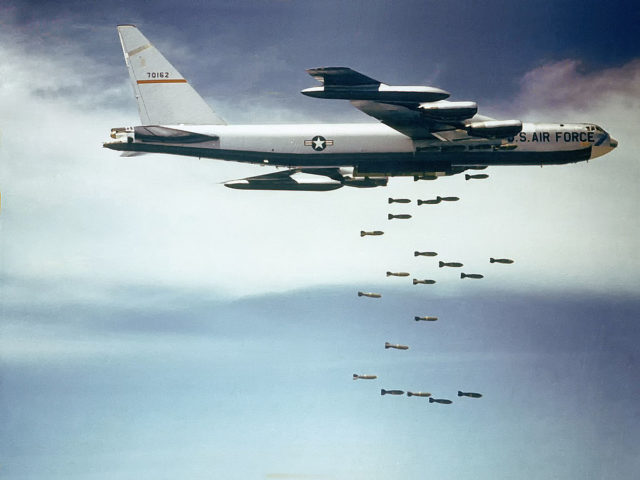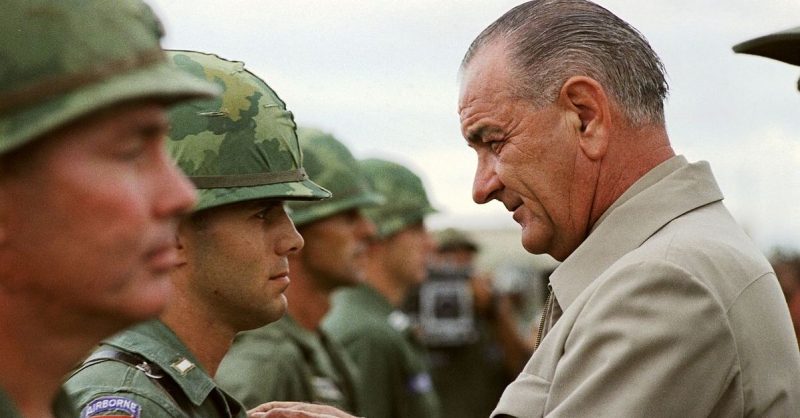Two months before the Gulf of Tonkin Resolution passed both the House and the Senate, on May 27, 1964, President Lyndon Johnson made two phone calls. The resolution would authorize the president to use military force in Southeast Asia to protect US interests.
The first phone call, made at 10:55, according to phone logs, was to Senator Richard B. Russell. Russell was a Georgia Democrat who was the head of the Armed Services Committee. Johnson asked for Russell’s opinion on the “Vietnam thing.”
Russell said that were he given the opportunity to solve the Vietnamese conflict any way he saw fit, he would decline. “It’s the damned worst mess I ever saw,” the Senator said.

At 11:24, Johnson called McGeorge Bundy. Bundy was Johnson’s national security advisor. Johnson compared Vietnam to Korea and echoed Russell: “…it’s just the biggest damned mess.”
He then uttered these prophetic words: “It’s damn easy to get into a war, but it’s going to be awfully hard to ever extricate yourself if you get in.”
These two calls encapsulate the crisis that defines Johnson’s presidency. But how did a president who understood the implications of what he was getting into allow himself, and his country, to get into such a disastrous war?
To be honest, Johnson inherited quite a mess. When the French left Vietnam in 1954, the country partitioned itself. Eisenhower and Kennedy sent billions of dollars in aid to the government of South Vietnam. The money was needed to prevent guerrilla forces from overtaking South Vietnam and reuniting the country under communist rule. The US could not abide by this outcome. Operating under the Domino Theory, the assumption was that if South Vietnam fell to the communists, the rest of Southeast Asia would follow.
But the situation in Vietnam was not improving on its own. With Kennedy’s approval, a military coup took place on November 1, 1963 which resulted in the assassination the South Vietnamese leader Ngo Dinah Diem.
Johnson himself was deeply troubled by the operation, stating that he did not believe assassination was ever the proper course of action. But, once he was president himself, the first order of business – even before the heads of state returned home from Kennedy’s funeral – was Vietnam.
Part of Johnson’s willingness comes from who he was and part of it comes from the times he lived in. He was a keen observer of human behavior, able to sense the frailties and weaknesses of people and then use them for his political advantage.
Since becoming president, Johnson had learned from the mistakes of other leaders. He was especially attuned to mistakes caused by weaknesses. When Johnson was serving his first term in Congress, he watched Britain’s Prime Minister Neville Chamberlain appease the Nazis in the mistaken belief he was buying peace. Instead, he was allowing Germany to invade Poland and Czechoslovakia and bringing about the beginning of World War II.
At the end of the war, Roosevelt’s lack of strength against Stalin led to the Soviets dominating Eastern Europe.
Truman sent US forces into Korea without planning for how to handle the war when Americans stopped supporting the war. Critics were also harsh in their assessment of how he failed to do anything about Mao’s rise to power in China.

Eisenhower’s terms in office were dominated by how the Soviets were doing. Any gains by them was proof that they were overtaking US dominance in the world leading to the Domino Theory and McCarthyism.
In 1957, Johnson was instrumental in improving the US space program after the Soviets put Sputnik in orbit.
When the dictator of Cuba, Fulgencio Batista, who was supported by the US government, was overthrown by Fidel Castro’s liberation forces, Johnson laid the blame at Eisenhower’s feet. He accused Eisenhower of sitting back and allowing the guerrillas to take Cuba by force.
So, in Johnson’s thirty years in office had taught him that weakness was never rewarded. He became determined to stand up to Ho Chi Minh, not because he had to win that battle, but because he could not afford to lose, The New York Times reported.
In the end, despite his initial misgivings, Johnson’s presidency became increasingly tied to the outcome of the Vietnam conflict. Once he got in, it was almost impossible to get out.
